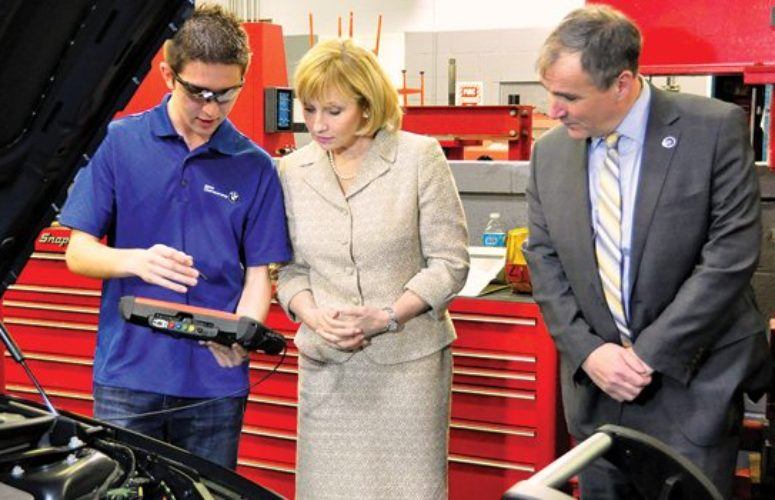
The Growth of Workforce Development
The low-down on aligning New Jersey’s workforce needs with state training programs and curriculum development.
By George N. Saliba, Managing Editor On Aug 25, 2014New Jersey has long had a highly-educated workforce which feeds industries ranging from biotechnology and pharmaceuticals, to healthcare and telecommunications, for example. Nonetheless, a New Jersey Business & Industry Association (NJBIA) survey reveals that in the aggregate, 75 percent of all employers have difficulty locating employees with the precise skill sets they require.
State government and other entities are full-throttle striving to address this dilemma by aligning curriculum and training with the workforce’s needs. Dr. Aaron R. Fichtner, deputy commissioner of the New Jersey Department of Labor and Workforce Development (LWD), says, “We really live in a knowledge-driven economy in New Jersey – more so than many other states – and are very much dependent upon knowledge industries. We don’t have huge, large-scale manufacturing. Manufacturing is still important, but we don’t have the manufacturing base that we once had. Also, we don’t have a lot of natural resources that other states such as North Dakota have. We are a well-educated state, but we have to keep focusing and helping people obtain the skills that would be useful to them.”
Melanie Willoughby, acting president of the NJBIA, says, “Training needs to be done in all industries. For instance, in manufacturing, [New Jersey] has very specific jobs that are going unfilled in metal fabrication, CNC machining and the coordination of mechanical and electrical machinery. We also need people in the healthcare field and biosciences. We are in need of lab technicians. However, the biggest need is ensuring that people also have ‘employability skills’ (a cluster of personal qualities, habits and attitudes that make someone a good employee). If a person doesn’t have employability skills, it is very hard for him or her to find a job, and it is also hard to keep a job. The No. 1 reason that people are fired is because of their lack of employability skills.”
That said, The Kauffman Foundation & The Information Technology and Innovation Foundation’s most recent study ranks the Garden State as the sixth best state for workforce education, and both NJBIA and LWD, in particular, have been aggressive in related endeavors. LWD has various iterations of programs that foster training, including the Opportunity4Jersey program, a training grant program. “We are saying, ‘We’re going to put state dollars out there, competitively, for colleges, educational institutions and training providers, that work to find groups of employers that have unmet skills needs, and that agree to work with those training providers to help develop a curriculum,” Fichtner says. “Then, the employers agree to interview everybody who completes the program. This is in instead of the old model we had years ago, when we would train people and keep our fingers crossed, and hope that people would get jobs. Our new program starts with the employers.”
These and similar efforts are part of a broader ecosystem which includes the state’s county colleges, vocational-technical schools and other entities. Dr. Lawrence A. Nespoli, president of the New Jersey Council of County Colleges, says, “We just could not be more pleased with our partnerships with Aaron and [Department of Labor & Workforce Development Commissioner Wirths]. They really get this. They really understand community colleges, and they really understand Training on Demand (another program). Everybody wins if they spend their training dollars in a way that connects with what the employers are telling us are their needs. The employers are involved from day one: Designing the program, delivering the program, even identifying the candidates who take the training.”
County colleges are especially well-equipped for workforce training, with some 70 campuses spread throughout the state, and decades of adult education experience. The colleges are nimble enough to respond to literally any training demand, and, for example, now even have mobile trailers that can be physically driven to sites to teach workers manufacturing skills.
And while industries need highly-skilled workers, NJBIA’s Basic Skills program addresses the need to upgrade the skills of entry-level workers. This program is a collaboration between NJBIA, LWD and the county colleges. It provides courses in: computer applications (Windows, Outlook, Excel, Word, PowerPoint); communications (verbal, writing, customer service); basic math/measurements; English as a Second Language and workplace Spanish.
The Basic Skills program has thus far educated approximately 80,000 workers, and its prowess is expected to further increase. Nespoli explains, “We did punch through a landmark: Since inception, the [New Jersey Community College Consortium for Workforce and Economic Development] has now trained more than 100,000 current workers in New Jersey’s workforce. A large portion of those – 80,000-plus – have been trained through the wonderful [Basic Skills] partnership with the NJBIA. Then, by arithmetic, another 20,000 so in other ways. Combined, I think that is a pretty great story, and it represents workers at 4,500 New Jersey employers.”
Sivaraman Anbarasan, executive director and CEO of the New Jersey Community College Consortium for Workforce and Economic Development, adds, “We haven’t scratched the surface. There are so many thousands of employers that haven’t found out about the [Basic Skills] program.”
Training is part of the workforce development equation, yet all of the above entities are also focused on long-term solutions. NJBIA’s Willoughby says, “We have an overall workforce development initiative to identify areas in which we have to build infrastructure to train the employees of the future, and that’s at all education levels, from high school, through college and into on-the-job training. We recognize that we can do this in many ways, but one of the crucial ways is to try to address it as early as possible in a young person’s life, so that he or she is focused on a career path – so that he or she can become a meaningful part of society, earlier.”
That’s one reason that NJBIA has collaborated with career and technical high schools, which are in every county, and provide businesses with interns and focused, well-trained, entry-level employees. Willoughby explains, “As a matter of fact, our career and technical coalition has more than 200 business partners, and it is working every day to bring businesses and technical high schools together. We also have a package of legislation to expand career and technical education in New Jersey, which was introduced by Senate President Stephen Sweeney and Assembly Speaker Vincent Prieto. We couldn’t have two better advocates for career and technical education. There are more than 17,000 students every year who want to go to a career and technical high school, and who cannot attend because of space considerations. We want to be sure that we can get them in there.”
Society perhaps places undue emphasis on earning a college degree, as it is viewed as an integral part of the American Dream; a vehicle to earn a solid income and prosper in other ways. However, a college degree is not necessarily the correct path for everyone, and, as Judy Savage, executive director of the New Jersey Council of Vocational-Technical Schools, points out, “Twenty five percent of individuals who have an industry certification, or a license, can earn more than the average bachelor’s degree recipient. That puts a number on the fact that we all hear about students who have invested four, five, six or more years in earning a [college] degree and have amassed a significant amount of debt. Some of these young people are graduating college and finding they are at a disconnect with the workforce, and that they are not able to walk into a job. On the other hand, some people with an HVAC license are able to walk into a job and earn a very good living.”
There are more than 60 vocational/technical schools in New Jersey, with 500-plus programs ranging from healthcare, information technology (including computer-assisted design and digital media, for example), construction trades, automobile technology and hospitality (comprised of both culinary arts, and food and beverage management), to name a few.
Of note, students who graduate from a technical school receive the same academics as students in traditional high schools, have career-specific technical skills, as well as broad-based employability skills. Also, 76 percent of technical-vocational school graduates gain additional education, with roughly 40 percent attending a four-year college, nearly 30 percent attending a two-year college, and another 6 percent enrolling in private, technical institutes. New Jersey’s aforementioned county colleges offer associates degrees and other opportunities for some of these students.
Parsippany-based IBEW Local 102 is also involved with workforce training with apprentices required to undertake a staggering 900 hours of classroom instruction, in addition to 8,000 hours of on-the-job training over an approximate five-year period. Most of the training is conducted at IBEW Local 102’s 16,000-square-foot training center.
Bernard Corrigan, president and training director, says, “That trains guys to be electricians. Then, we started getting more into continuing education. We recently signed an articulation agreement with Union County College, whereby our apprentices will now not only graduate as electricians – they come out with an associate’s degree.”
He adds, “As a state – not just IBEW Local 102 – we have to try to be better prepared for the businesses that are coming to New Jersey. Our education is phenomenal. I believe CNBC rated us as No. 1 in the nation, with education. So, it is not that the education isn’t there, but is the proper education there? Are we educating the guys properly for the jobs that are available? I would like to be able to have our guys already trained [via expanding educational opportunities], so when these companies come to New Jersey, we can say, ‘They are there for you. You don’t need a search team – we have them.’”
Traditional, four-year higher education institutions are also a critical component of workforce development, and Jersey City-based New Jersey City University (NJCU) is a prime example. NJCU obviously has a broad array of cutting-edge, full-fledged degree programs, but, it can additionally train workers in specific areas.
NJCU’s president, Dr. Sue Henderson, says, “We just opened a logistics institute. That came about as a result of a port logistics businessman with about 300 employees. The technology in his field is constantly changing, and he needs these employees to be trained and have a certificate, to show that they know the latest technologies. He helped us create the training curriculum. He has gone out to his fellow logistics firms and said, ‘NJCU is willing to work with you to create specific certificate programs so that the employees have the latest training that they need.’
“This is a more efficient model for a business, because it is a way they can upgrade the skills of their employees without in-house training.”
Separately, NJCU is also in the process of establishing an institute for training mediators, and yet another institute for risk management in the financial services arena.
All told, New Jersey’s major players – whether it’s LWD, NJBIA, colleges and universities, or vocational-technical schools – are ensuring New Jersey’s famed workforce and economy (the latter of which is the 28th largest in the world), become even better.
LWD’s Fichtner concludes, “If any of the folks who are reading the magazine have [prospective or current employee] skill issues, we are prepared as a department, through our Talent Networks, through our business service representatives, or through the folks that work our [workforce grants and program management] operation, to come out – talk to them – and figure out how we can be part of a solution. We want to be business driven and responsive to business, while also doing the important job of helping people who are unemployed get back to work.”
Related Articles:





